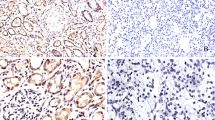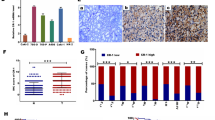Abstract
Aldehyde dehydrogenase 1A1 (ALDH1A1) has been characterized as a cancer stem cell marker in different types of tumors. It plays a key role in various biological processes in tumor, including cell proliferation, invasion and chemoresistance. Recently, ALDH1A1 has been described as a prognostic marker in various tumors. In this study, we detected the expression of ALDH1A1 in 95 clear cell renal cell carcinoma (ccRCC) by immunohistochemistry and correlated it with clinicopathological parameters and prognosis. We further explored the correlation of ALDH1A1 expression to proliferation, invasion and drug sensitivity of renal cancer cell in vitro by silencing of ALDH1A1 in A498 renal cell line. ALDH1A1 protein showed high expression in 53 of 95 cases of ccRCC (56.8 %), which was significantly higher than that in normal tissues (5/23, 21.7 %). ALDH1A1 overexpression was significantly associated with tumor stage (P = 0.000), recurrence (P = 0.000), tumor size (P = 0.000) and vascular invasion (P = 0.023). The Kaplan–Meier survival analysis demonstrated that ALDH1A1 overexpression was significantly associated with shorter recurrence-free survival and overall survival (P = 0.003 and P = 0.008, respectively). Multivariate analysis demonstrated that ALDH1A1 was an independent prognostic factor for patients with ccRCC. Experiments in vitro further showed ALDH1A1 played an essential role in proliferation, invasion and drug sensitivity of renal cancer cell. In conclusion, ALDH1A1 might be a potential molecular marker in ccRCC, which provided us with a new therapeutic target in ccRCC.



Similar content being viewed by others
References
Rini BI, Rathmell WK, Godley P. Renal cell carcinoma. Curr Opin Oncol. 2008;20(3):300–6.
Eichelberg C, Junker K, Ljungberg B, Moch H. Diagnostic and prognostic molecular markers for renal cell carcinoma: a critical appraisal of the current state of research and clinical applicability. Eur Urol. 2009;55(4):851–63.
Belldegrun AS. Renal cell carcinoma: prognostic factors and patient selection. Eur Urol Suppl. 2007;6(7):477–83.
Bussolati B, Bruno S, Grange C, Buttiglieri S, Deregibus MC, Cantino D, et al. Isolation of renal progenitor cells from adult human kidney. Am J Pathol. 2005;166(2):545–55.
Sagrinati C, Netti GS, Mazzinghi B, Lazzeri E, Liotta F, Frosali F, et al. Isolation and characterization of multipotent progenitor cells from the Bowman’s capsule of adult human kidneys. J Am Soc Nephrol. 2006;17:2443–56.
Kim K, Ro JY, Kim S, Cho YM. Expression of stem-cell markers OCT-4 and CD133: important prognostic factors in papillary renal cell carcinoma. Hum Pathol. 2012;43(12):2109–16.
Kim K, Ihm H, Ro JY, Cho YM. High-level expression of stem cell marker CD133 in clear cell renal cell carcinoma with favorable prognosis. Oncol Lett. 2011;2(6):1095–100.
Yoshida A, Hsu LC, Davé V. Retinal oxidation activity and biological role of human cytosolic aldehyde dehydrogenase. Enzyme. 1992;46(4–5):239–44.
Armstrong L, Stojkovic M, Dimmick I, Ahmad S, Stojkovic P, Hole N, et al. Phenotypic characterization of murine primitive hematopoietic progenitor cells isolated on basis of aldehyde dehydrogenase activity. Stem Cells. 2004;22(7):1142–51.
Chute JP, Muramoto GG, Whitesides J, Colvin M, Safi R, Chao NJ, et al. Inhibition of aldehyde dehydrogenase and retinoid signaling induces the expansion of human hematopoietic stem cells. Proc Natl Acad Sci USA. 2006;103(31):11707–12.
Hess DA, Craft TP, Wirthlin L, Hohm S, Zhou P, Eades WC, et al. Widespread non-hematopoietic tissue distribution by transplanted human progenitor cells with high aldehyde dehydrogenase activity. Stem Cells. 2006;26(3):611–20.
Hess DA, Wirthlin L, Craft TP, Herrbrich PE, Hohm SA, Lahey R, et al. Selection based on CD133 and high aldehyde dehydrogenase activity isolates long-term reconstituting human hematopoietic stem cells. Blood. 2006;107(5):2162–9.
Hilton J. Role of aldehyde dehydrogenase in cyclophosphamide-resistant L1210 leukemia. Cancer Res. 1984;44(11):5156–60.
Ginestier C, Hur MH, Charafe-Jauffret E, Monville F, Dutcher J, Brown M, et al. ALDH1 is a marker of normal and malignant human mammary stem cells and a predictor of poor clinical outcome. Cell Stem Cell. 2007;1(5):555–67.
Huang EH, Hynes MJ, Zhang T, Ginestier C, Dontu G, Appelman H, et al. Aldehyde dehydrogenase 1 is a marker for normal and malignant human colonic stem cells (SC) and tracks SC overpopulation during colon tumorigenesis. Cancer Res. 2009;69(8):3382–9.
Jiang F, Qiu Q, Khanna A, Todd NW, Deepak J, Xing L, et al. Aldehyde dehydrogenase 1 is a tumor stem cell associated marker in lung cancer. Mol Cancer Res. 2009;7(3):330–8.
Chen YC, Chen YW, Hsu HS, Tseng LM, Huang PI, Lu KH, et al. Aldehyde dehydrogenase 1 is a putative marker for cancer stem cells in head and neck squamous cancer. Biochem Biophys Res Commun. 2009;385(3):307–13.
Chang B, Liu G, Xue F, Rosen DG, Xiao L, Wang X, et al. ALDH1 expression correlates with favorable prognosis in ovarian cancers. Mod Pathol. 2009;22(6):817–23.
Lugli A, Iezzi G, Hostettler I, Muraro MG, Mele V, Tornillo L, et al. Prognostic impact of the expression of putative cancer stem cell markers CD133, CD166, CD44 s, EpCAM, and ALDH1 in colorectal cancer. Br J Cancer. 2010;103(3):382–90.
Ozbek E, Calik G, Otunctemur A, Aliskan T, Cakir S, Dursun M, et al. Stem cell markers aldehyde dehydrogenase type 1 and nestin expressions in renal cell cancer. Arch Ital Urol Androl. 2012;84(1):7–11.
Harada S, Agarwal DP, Goedde HW. Electrophoretic and biochemical studies of human aldehyde dehydrogenase isozymes in various tissues. Life Sci. 1980;26(21):1773–80.
Yanagawa Y, Chen JC, Hsu LC, Yoshida A. The transcriptional regulation of human aldehyde dehydrogenase I gene. The structural and functional analysis of the promoter. J Biol Chem. 1995;270(29):17521–7.
Elizondo G, Corchero J, Sterneck E, Gonzalez FJ. Feedback inhibition of the retinaldehyde dehydrogenase gene ALDH1 by retinoic acid through retinoic acid receptor alpha and CCAAT/enhancer-binding protein beta. J Biol Chem. 2000;275(50):39747–53.
Sitnikova L, Mendese G, Liu Q, Woda BA, Lu D, Dresser K, et al. IMP3 predicts aggressive superficial urothelial carcinoma of the bladder. Clin Cancer Res. 2008;14(6):1701–6.
Acknowledgments
This work was supported by grants from National Natural Science Foundation of China (No. 30873097). We thank Yu-hou Chen and Yan Song for their excellent language editing.
Conflict of interest
The authors declare that they have no conflict of interest.
Author information
Authors and Affiliations
Corresponding author
Rights and permissions
About this article
Cite this article
Wang, K., Chen, X., Zhan, Y. et al. Increased expression of ALDH1A1 protein is associated with poor prognosis in clear cell renal cell carcinoma. Med Oncol 30, 574 (2013). https://doi.org/10.1007/s12032-013-0574-z
Received:
Accepted:
Published:
DOI: https://doi.org/10.1007/s12032-013-0574-z




